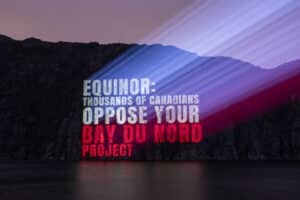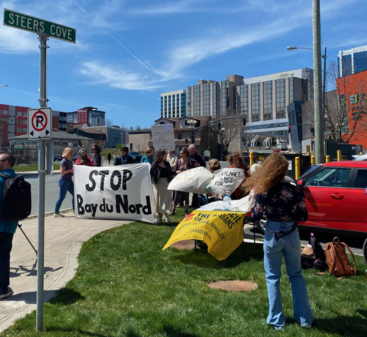 Also today: Concerned Newfoundlanders and Labradorians protest at Equinor’s office in St. John’s, and Equinor’s AGM hears directly from a Canadian on the risks of Bay du Nord.
Also today: Concerned Newfoundlanders and Labradorians protest at Equinor’s office in St. John’s, and Equinor’s AGM hears directly from a Canadian on the risks of Bay du Nord.
For Immediate Release, May 11th, 2022
Stavanger, NORWAY and St. John’s, CANADA – A striking projection appeared on buildings and other local landmarks in Stavanger on the eve of Equinor’s AGM. The videos featured testimony from Canadians opposing Equinor’s proposed offshore oil project, Bay du Nord, highlighting the risks to marine habitat and the climate.
Gretchen Fitzgerald, the National Programs Director for Sierra Club Canada Foundation, was in Norway and spoke directly to Equinor shareholders and leadership about Canadians’ concerns with this project.
“Equinor’s Bay du Nord flies in the face of climate science and would be a clear violation of our attempts to meet climate targets. Bay du Nord’s oil would generate over 30 million tonnes of carbon pollution a year,” Fitzgerald says. “We call on Equinor’s shareholders, Equinor’s leadership, and Norwegian leaders to do the right thing: cancel Bay du Nord. Don’t put our shared climate and precious marine ecosystems at risk. Instead, invest in wind and solar projects that will protect our climate and create jobs in Newfoundland and Labrador, the province with the greatest potential for wind energy.”
Concerned Newfoundlanders and Labradorians protest outside Equinor’s Canadian office in St. John’s, Newfoundland and Labrador at 12:00pm NT.

Protest against Bay du Nord in St. John’s, Newfoundland and Labrador, Canada.
A crowd gathered outside of Equinor’s office in downtown St. John’s today, protesting the company’s continued pursuit of the project. Speakers demanded that the corporation invest in renewable energy development instead and provide lasting, stable employment for the province.
“In our current climate crisis, with fossil fuels being the largest contributor to greenhouse gasses and global warming, we strongly oppose any further development of Newfoundland & Labrador’s offshore oil fields. The touted “clean oil” at Bay du Nord burns just as lethally for the planet’s survival and will make meeting Canada’s reduced emissions promises impossible,” says Yvonne Earle, contact person for the Avalon Chapter of the Council of Canadians in Newfoundland and Labrador. “Now is the time to invest aggressively and equitably in jobs that can make our communities more sustainable and resilient. Fossil fuel infrastructure is neither the resilient nor sustainable type of investment we need.”
Also announced today: Canadian environmental groups are launching a lawsuit to overturn the federal government’s approval of Bay du Nord. Ecojustice, on behalf of Équiterre and Sierra Club Canada Foundation, filed the lawsuit in the Federal Court. The groups say the project’s approval clashes with Canada’s international obligations and the urgent call to reduce global emissions as the reality of the climate emergency becomes more distressing with every severe weather event.
“The Canadian government is attempting to greenwash Bay du Nord by touting its potential use of Carbon Capture and Storage (CCS) – but no amount of greenwashing can hide the fact that the massive amount of oil generated by the project will not be offset and will damage our climate,” said Colleen Thorpe, Executive Director, Équiterre.
Equinor’s offshore activities in Canada are not the only ones under scrutiny. In Argentina, environmental lawyers presented new evidence yesterday (Tuesday) in the legal case against the Argentine government’s approval of Equinor’s seismic exploration for oil and gas in the pristine North Argentine Sea. Equinor wants to conduct seismic exploration in one of the most biodiverse areas of the North Argentine Sea; this case aims to stop that.
 “In Norway, Argentina, and Canada alike, Equinor is blatantly ignoring science and people. In the midst of a climate emergency, Equinor wants to establish new petroleum production in invaluable ecosystems. A shift in Equinor is way overdue. I hope this year’s AGM will steer the company away from some of the world’s worst projects,” said Frode Pleym, head of Greenpeace Norway.
“In Norway, Argentina, and Canada alike, Equinor is blatantly ignoring science and people. In the midst of a climate emergency, Equinor wants to establish new petroleum production in invaluable ecosystems. A shift in Equinor is way overdue. I hope this year’s AGM will steer the company away from some of the world’s worst projects,” said Frode Pleym, head of Greenpeace Norway.
###
For contact information for media interviews please contact media@sierraclub.ca
Background and Quotes
The Canadian government approved Bay du Nord last month, just two days after the IPCC’s latest report made it clear we need rapid, deeper cuts to fossil fuel projects and the UN Secretary General called funding new fossil fuel projects ‘moral and economic madness.’
The approval came after a deeply flawed environmental assessment process that failed, among other things, to assess the risk of accidents and spills or address impacts on deep sea coral, sponges, and whales. The assessment also did not include a previous massive oil spill by Husky Energy (Equinor’s partner in Bay du Nord). This is concerning as the project does not require a key safety mechanism, a capping stack, to limit damage in case of a spill. Current estimates from Equinor suggest 18-36 days to cap a deep-sea blow out.
“That would be 36 days of potential spill right into the marine ecosystems Newfoundland and Labrador’s fisheries depend on,” says Heather Elliott in St. John’s, local campaigner for Newfoundland and Labrador with the Sierra Club Canada Foundation. “That timeline also assumes perfect weather conditions. By comparison, BP’s Deepwater Horizon in the Gulf of Mexico took 87 days to cap, and weather conditions are usually far more favourable there.”
The use of carbon capture and storage (CCS) is often proposed as a way to make oil production environmentally sound. The amount of carbon that Bay du Nord would produce (from production to consumption of product) will not be offset by these measures. Read more about CCS here.
